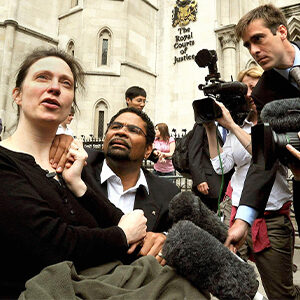 The Crown Prosecution Service (CPS) has updated its figures today, showing that five new cases of assisting a suicide have been referred to them since March 2023. My Death, My Decision urges parliament to get on with legislating for assisted dying, instead of leaving a ‘messy’ law to be interpreted by the CPS.
The Crown Prosecution Service (CPS) has updated its figures today, showing that five new cases of assisting a suicide have been referred to them since March 2023. My Death, My Decision urges parliament to get on with legislating for assisted dying, instead of leaving a ‘messy’ law to be interpreted by the CPS.
From 1 April 2009 up to 31 March 2024, the CPS’s manual records indicate there have been 187 cases referred to them by the police that have been recorded as assisted suicide. This represents five new cases from 31 March 2023 to 31 March 2024.
Of the cases this year, two were not preceded with, one was withdrawn by the police and two more are ongoing. This brings the total since 2009 to 127 that were not proceeded with by the CPS and 36 cases were withdrawn by the police.
Since 2009, four cases of encouraging or assisting suicide have been prosecuted. One case of assisted suicide was charged and acquitted after trial in May 2015 and eight cases were referred onwards for prosecution for homicide or other serious crime.
Claire Macdonald, Director of My Death, My Decision, said:
‘We agree with Sir Keir Starmer, the law is an absolute mess when it comes to assisted dying, and needs to be fixed. We don’t know the details of these recent cases, but we do know that it is barbaric to investigate and prosecute people who help their loved ones die, when the loved one is suffering and has come to a clear and settled wish. There’s no public interest in punishing compassion.
Our supporter Sue Lawford was arrested at 5am, jailed for 19 hours and investigated for six months, for the compassionate act of accompanying Sharon Johnston to Switzerland. Sharon had filmed an entire BBC documentary about her wish to die on her own terms’.

Since 2009, prosecutors have decided whether or not to charge someone with helping another to die by following the Director of Prosecutions’ Guidelines on Assisted Dying.
Before 2009, it was unclear when someone might be prosecuted for helping another person to die. As a result, a legal case was successfully brought against the Director of Public Prosecutions by Debbie Purdy, a former music journalist who suffered from the incurable condition multiple sclerosis. The UK’s highest court ruled that the Director of Public Prosecutions had to clarify the factors that they would consider when deciding whether to bring a criminal prosecution.
Following Debbie Purdy’s case, the then Director of Public Prosecutions, Sir Keir Starmer, issued the current guidelines on assisted dying. They have been updated on only one occasion since then, to clarify that medical staff are, by virtue of their position, more likely to be prosecuted if they assist someone to whom they owe a duty of care.
The Director of Public Prosecutions’ Guidelines on Assisted Dying apply both to assisted deaths that occur abroad and within the UK.

The guidelines do not state every factor which could be relevant, but broadly suggest it is less likely a prosecution would be in the ‘public interest’ if someone:
- Made a voluntary, clear, settled, and informed decision to end their life
- Was wholly motivated by compassion when helping someone else to die
- Provides help ‘of only minor encouragement or assistance’
- Attempts to dissuade another person from ending their life before helping
- Reluctantly provides help to another person
- Reports to the police that they have helped someone to die, and fully assists any investigation.
Alternatively, the guidelines also indicate that it is more likely a prosecution would be in the ‘public interest’ if someone:
- Helps someone aged under 18 years old
- Helps someone who was not of sound mind (meaning they did not have ‘mental capacity’)
- Helps someone without a voluntary, clear, settled, and informed decision to end their life
- Was not wholly motivated by compassion e.g. choosing to help someone because they stand to gain in some way from their death
- Pressures someone or did not take steps to ensure that someone was not being pressured into ending their life
- Helps someone who was not physically able to end their life themselves
- Helps someone who was a stranger
- Helps someone in their capacity as a medical doctor, nurse, or other healthcare professional.
Notes:
Members of the MDMD team, as well as individuals affected by the current law on assisted dying, are available for interview upon request
For further comment or information, media should contact Nathan Stilwell at nathan.stilwell@mydeath-mydecision.org.uk or phone 07456200033.
My Death, My Decision is a grassroots campaign group that wants the law in England and Wales to allow mentally competent adults who are terminally ill or intolerably suffering from an incurable condition the option of a legal, safe, and compassionate assisted death. With the support of over 3,000 members and supporters, we advocate for an evidence-based law that would balance individual choice alongside robust safeguards and finally give the people of England and Wales choice at the end of their lives.

